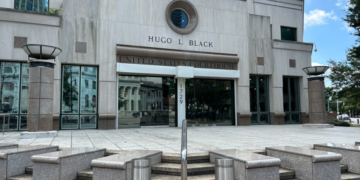August 6, 2025 Story by: Editor
On this day in American history, President Lyndon B. Johnson signed into law one of the most significant pieces of civil rights legislation ever passed by Congress — the Voting Rights Act of 1965. This landmark measure enforced the Fifteenth Amendment of the Constitution by outlawing discriminatory practices that had, for decades, disenfranchised Black American voters, particularly in the South.
The Voting Rights Act of 1965 was signed into law on August 6, 1965 and the signing ceremony took place in the President’s Room of the Capitol building in Washington, D.C.
This “act to enforce the Fifteenth Amendment to the Constitution” was signed into law 95 years after the amendment was ratified. In those years, African Americans in the South faced tremendous obstacles to voting, including poll taxes, literacy tests, and other bureaucratic restrictions to deny them the right to vote. They also risked harassment, intimidation, economic reprisals, and physical violence when they tried to register or vote. As a result, African-American voter registration was limited, along with political power.
In 1964, numerous peaceful demonstrations were organized by Civil Rights leaders, and the considerable violence they were met with brought renewed attention to the issue of voting rights.
The murder of voting-rights activists in Mississippi and the attack by white state troopers on peaceful marchers in Selma, Alabama, gained national attention and persuaded President Johnson and Congress to initiate meaningful and effective national voting rights legislation.
The combination of public revulsion to the violence and Johnson’s political skills stimulated Congress to pass the voting rights bill on August 5, 1965.
Background: A Nation Divided at the Ballot Box
Though the Fifteenth Amendment (ratified in 1870) had constitutionally guaranteed the right to vote regardless of race, many states continued to implement policies designed to exclude Black Americans from the polls. These included literacy tests, poll taxes, intimidation, and other bureaucratic hurdles, particularly in states with a history of racial discrimination in voting.
The momentum for federal action was spurred by the civil rights movement’s nonviolent protests, including the now-iconic march from Selma to Montgomery, Alabama — a demonstration that shocked the conscience of the nation and moved Congress to act.
Key Provisions of the Act
The Voting Rights Act of 1965 outlawed the use of literacy tests and gave the U.S. Attorney General the authority to send federal examiners to register eligible voters in jurisdictions where such discriminatory practices had been prevalent.
One of the Act’s most significant features was its requirement that certain jurisdictions with a history of voting discrimination obtain federal approval (“preclearance”) before making any changes to their voting laws or procedures. This provision ensured that changes could not be used to disenfranchise voters under a new guise.
Immediate Impact
The Voting Rights Act had an immediate impact. By the end of 1965, a quarter of a million new Black voters had been registered, one-third by federal examiners. By the end of 1966, only four out of 13 southern states had fewer than 50 percent of African Americans registered to vote. The Voting Rights Act of 1965 was readopted and strengthened in 1970, 1975, and 1982, and 2006.
Preserving the Right to Vote
By passing the Voting Rights Act, Congress enacted a powerful enforcement mechanism that carried the full weight of federal authority. The Act stood not only as a major victory of the civil rights movement, but also as a reaffirmation of the constitutional principle that no citizen shall be denied the right to vote on account of race or color.
As the National Archives notes, this law is one of the “Milestone Documents” of American history, standing alongside the Constitution, the Emancipation Proclamation, and the Civil Rights Act of 1964 in its enduring impact on democracy.
Source: U.S. National Archives

















